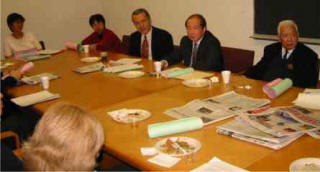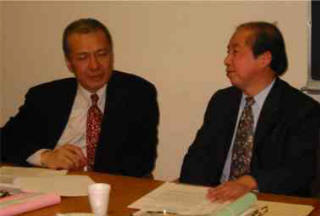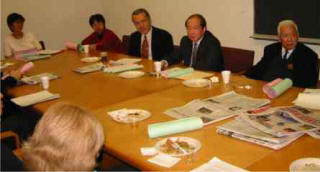
Chinese modern education refers to one hundred and ten years of education in China from 1840 to 1949. Within this 110 years, under foreign influences and subjecting to the practical needs of China’s social transformation, there was a tremendous change in Chinese education. An orientation to look outward began to take shape in Chinese education, steering away from the developmental tracks laid down from the past several millennia.
With its active learning from the West, particularly the educational experience of Japan and America, and their integration into the actual social conditions in China, new schools were established to form a new education system. In contrast to the traditional experience, we call it the new education. This new education was given birth through the gestation of traditional education, and survived mightily despite a series of obstacles. It grew big and strong, gradually developed into the main component of Chinese modern education. Among the many Chinese educators who tirelessly contributed their creative energies to the important development of Chinese new education, Tsai Yuen Pei, whom I will introduce, is a shinning example.
Tsai Yen Pei (1868 – 1940), from Shao Hsing County in Zejiang province, received an excellent traditional education while growing up, was a fortunate product of the selective examination system. Top of his class at the age of 25, he began his service at the emperor’s important and promising advisory council at 27. The failure of the 1898 reformation taught him the importance of education administration and human resource development, and led him to devote himself to education, changing his life course. He developed and directed several new style schools in Zejiang and Shanghai. At the same time, he actively participated in the revolutionary activities against the rule of the Ching Dynasty.
In 1905, he was appointed to the director of the Shanghai branch of Mr. Sun Yat Sen’s revolutionary party. Tsai Yuen Pei was a founding member of the Kuo Min Tang. After the 1911 October 10th Revolution, he assumed many important posts within the government of the Republic of China and the Kuo Ming Tang party. Important posts in Culture and education include: 1912, he became the first ROC minister of education; 1917-1926, he was the president of Nanking National Government university; 1928, he established the Central Research Institute and became its director until his death in 1940. It’s also necessary to point out that, in this short introduction of Tsai Yuen Pei’s biography, he has studied, worked, and traveled in foreign countries for extended periods of time. In the 20 years from 1907-1926, he has left China five times and lived overseas for almost 11 years. During this period, he has studied or done research in Germany three times for a period of seven years. When he was studying and working in France, he advocated for and organized the work-study program for Chinese students to go to France. In 1920-1921, he studied higher education in Europe and America for a year. Tsai Yuen Pei was known within academia as “someone whose knowledge traverses China and the West, and his understanding links the ancient to the modern.
Tsai Yuen Pei’s rich experience can be seen from above, and his contributions to Modern Chinese society are multifaceted. Within the field of education, I find his contributions to China’s modern education distinguishing in the following four areas:
1. Outstanding representation in the reform of feudalistic education.
From the end of the 19th Century to the beginning of the 20th Century, this epoch called for and demanded a criticism and reformation of feudal education. The history of Chinese modern education was illustrated by numerous individuals who engaged in such advocacy. Tsai Yuen Pei distinguished himself from the rest not only because of his commitment, steadfastness and depth of understanding in education reform, insisting on the critical absorption of feudal cultural education instead of total rejection. His fame rested chiefly on his leadership and organization of the great reformation of the feudalistic education system within the entire country. After the 1st revolution, responding to the demand of the time, when Tsai became the first minister of education, he abolished the education principles of “loyalty to the emperor” and “respect for Confucius”, he prohibited the use and study of textbooks issued by the education department of the Ching Dynasty, thereby eliminated the traditional process of personal advancement through the selective examination system. This was a powerful assault on the feudal education, unprecedented in its actual impact on education, in its breadth and depth of the reform. When he became the president of Beida in 1917, he turned a corrupt, feudal and bureaucratic institution into a nationally respected university. During his tenure as the minister of higher education, he abolished the traditional practice of seasonal ritual of paying homage to Confucius. All these measures left indelible imprints on the reform of feudal education, well beyond what his contemporaries proposed.
2. Founder of the New Education System
Since his decision to devote himself to education in 1898, Tsai Yuen Pei worked hard to set up a new education system in China. After the first revolution, he established a three-tier education administrative structure, created an educational council that represented the highest decision making body in education, and introduced a division of social education, starting a trend of social education administration, a term that is still used nowadays. He was the first to suggest the principle of Five Educations: Military Education, Utilitarian Education Civics Education, Global View Education, and Artistic Education, a forerunner to the educational foundation of the ROC:
Under his administration, new rules and regulations were established for the school system. He meticulously planned and directed the first national education conference, which he passed a series of policies and programs based on which China’s modern education structure was modeled. In addition, he introduced co-education to china starting from primary school to the university. If this is considered to be the developmental mainstream of China modern education, the river head can be traced to Lin Tsa-Hsu, Guang Tse Jun, and Wei Yuan, followed by the foreign affairs party and other early reformers. It was only after the first revolution that Tsai Yuen Pei became the minister of education, however, that the dream held dear by so many heroes, of establishing a relatively complete new education system in China was realized. No doubt, the times played an important role in the opening of a new era in Chinese educational development, but the contribution by Tsai Yuen Pei cannot be underestimated.
3. Pioneer of modern university education
The history of Chinese university education started very early. University educational structure was set up as early as the western Chou dynasty (771 BC). The birth of modern Chinese university, however, was symbolized by the establishment of the Imperial University in 1898, despite its feudalistic imprint. After 1912, when the ROC was founded, it was renamed Peking University. Despite reform efforts, the institution was beset by feudalistic and bureaucratic problems. Only after Tsai Yuen Pei became president, was he able to install a series of effective measures to remold the corrupt old campus into an intellectually challenging and dynamic institution of higher learning, giving ground to the New Cultural Movement which later enveloped China. In his reform of Peking University, Tsai yuen Pei formulated a set of theory on university education. He believed that the university was a place for advanced research. In addition to teaching, it was necessary to create scientific research institutes. He promoted academic freedom and tolerated a variety of thoughts, as long as they are reasonable and consistent. He introduced “interdisciplinary approach” to accommodate the increasingly merging tendencies of different disciplines and started a system to allow student to select their own majors. He demanded that professors manage the university, to establish a democratic administrative structure by experts and scholars who understood education. Tsai Yuen Pei’s reform of Peking University and his theory of comparative education systems left long lasting influence in the development of Chinese Modern education. Many of his viewpoints remained inspirational even now.
4. Champion of Artistic Education
Tsai Yuen Pei emphasized greatly the role of artistic education: He was a major innovator to bring art into the school curriculum. In 1906, Huang Kuo Wei has written about the merits of artistic education and included it as a foundation of education. The impact of Tsai Yuen Pei’s actions, however, vastly exceeded that of Huang Kuo Wei. During his reign as the minister of education, he systematically elaborated the effect of artistic education on intellectual development and the harmony between mind and body. Since then, artistic education became an important component of the education enterprise. Later on, he advocated tirelessly to substitute religion with artistic education, and introduced practical ways to apply it to family, school and the society. He was a practitioner of artistic education. When he studied in France, and was the editor of a magazine on Chinese workers education, he wrote many articles concerning art and artistic education.
When he was president at Peking University, he actively promoted many art-related groups, such as concerts, drawings and calligraphy. He introduced art into the school curriculum by hiring experts to teach, sometimes going to the lectern himself. He was an ardent supporter of the Peking Art institute and feverishly championed the development of the Shanghai Artist League.
Most importantly, he founded the Shanghai National Music Academy when he became its director in 1927, and established the National Art Institute in 1928. These two institutes nurtured a large number of art and music talents and made important contributions to China’s artistic enterprise.
It is fair for scholars nowadays to praise Tsai Yuen Pei as the innovator of china’s artistic education, and the only stalwart of artistic education in the history of Chinese Modern education.
To sum up, based on the solid foundation and brilliant achievement of China’s new education system, his creation of modern education theory, his innovative development of modern education enterprise, without question, Tsai yuen Pei occupied a supreme place in the history of Chinese Modern education. Tsai Yuen Pei was a forerunner of Chinese intellectuals and a great educator.
Translated by Dr. Thomas Tam

to prepare for its translation to the audience.
Q & A Session
Q (Betty Lee Sung): What is the legacy of Tsai Yuen Pei after the Communist Revolution?
A: Tsai Yuen Pei died before the Communist Regime was established. His fate of his rise and fall is constant. Before the Cultural Revolution, he was labeled a liberal intellectual. He was not a friend of the Communist. He was not revered publicly. There was not much research about him. After the Cultural Revolution, there was some change in official opinion. There was a conference commemorating the 40-year anniversary of his death in Beijing. Tsai Yuen Pei was declared to be an Educator, a Cultural Patriot, a Revolutionary and a Scientist. Now, there is more research sprouting about him. I entered this field of research about him from the perspective of Education.
Q (Don Watson): What is the impact of education reform on the disciplines of Science and Technology?
A: In the opening of China, there was a concentration of Science and Technology development. There was a tie between Technology and Education. The blueprint of Education reform came from the Menji Revolution in Japan. Initially, China wanted to learn from all countries around the world and translated everything into Chinese. Students who went to Japan all studied education and they returned to assume high parts in China. Students who went to Europe and America however, were not students of Education. This is why the Japanese model of education has a strong influence in China. After 1920, the influence changed to America and now the people who studied there play an important role in the Chinese education system.
Q (Paul Seto): What is the relationship between Mao Tse Tung and Tsai Yuen Pei when they had both worked in the library?
A: Mao was the Assistant Manager of the library. He must have respected Tsai Yuen Pei. In 1922, Tsai Yuen Pei gave many lectures in Hunan where Mao came from. Mao was the recorder of these lectures. Mao created a school for self-studies in Hunan in 1921. Tsai Yuen Pei had written articles to promote it. Tsai Yuen Pei must have recognized Mao’s youth, enthusiasm and energy.
Q (Betty Lee Sung): What is the philosophy of the Education department of the government today?
A: In China, modernization cannot be done without education. Education occupies a strategic position for economic development. This is the relationship between socialism and education. Education must serve the modernization development of the economy. You cannot have education isolated from this social reality. This is the directive on education in China.
Q (Betty Lee Sung): Can education and educators be pushed down again (as in the past)?
A: Teng Xiao Ping, under him, he wouldn’t let it happen. He believed that education played a strategic role in modern China. Education must be looked at the same way as energy, and transportation, etc. Education must be put in high priority. Some high authorities put economics before education. But Teng Xiao Ping said that in order to have a vibrant economy, you have to have education. If you don’t follow that, you are a bad leader. Not all leaders are like Teng Xiao Ping in regards to education but they are now trying to follow him.
Q (Don Watson): In 1999 there was a National Conference for quality oriented education, moving away from exams and focus on creativity. How does that affect China today?
A: In China, emphasis on creativity is in the children because of the importance of creativity in social development. Emphasis is on education. The nurturing of creativity has been talked about for a while, not just now. With my research on Tsai Yuen Pei, I didn’t touch this area. College students should not just do well in school and attend classes, they should also do well in research. Professors should not be just good professors, but good leaders in research.
Q (James Lap): Is the government ready for the change in the economy of China and face more educators? Since with the two they become more independent?
A: People who are educators or economically sufficient are easily independent. New patterns of thought are not accepted even in the University. People have different opinions. With more education, you are more able to accept new ideas. There is an imbalance between how people accept things. The imbalance comes from the rural sector vs. the urban sector. Different levels of education will give you different levels of social status and influence.
Q (Betty Lee Sung): What is the education system in China now? Is it free or do you have to pay?
A: There is no tuition for Primary School and Junior High, you pay for fees only. Before Primary School and after High School, it is not compulsory education, but voluntary. Because the kind of education will determine the future of the child. They want them to get into the famous schools at birth. Competition would begin at nursery school. It’s hard to enter some nursery schools in Shanghai. Parents must compete as well with power, money, etc. If you go to the famous nursery school, then you continue onto the famous kindergarten, etc. School depends on where you live. You can pay to go to another public school in another district, however. This is particularly serious with the One-Child family, because with two or more children, if one fails, there is another chance. Not if you have only one child. So competition is keen. Exams must be taken in order to get in High School and college and a fee.
Education system: Nursery School 0-3 years old
Kindergarten enter at 3 years old for 3 years
Primary School for 6 years
Secondary School for 6 years (3 for Junior & 3 for Senior)
University for 4 years
Masters for 3 years
Doctoral for 3 years
Q (Lee Stollar): Are there grants for bright students? Scholarships?
A: There is saying that “Never let a kid not attend college because of economic reasons.” They have learned from foreign experience. If a family is poor, they can file for exemption and have the tuition waived. There are also bank loans that must be paid in 4 years after graduation. Really gifted students get scholarships, but not as well endowed as in America. With the rise in Chinese economy, the amount for scholarships will go up. It is more difficult for students who come from rural areas.
Prepared by Anchalee A. Pongsrirojana

